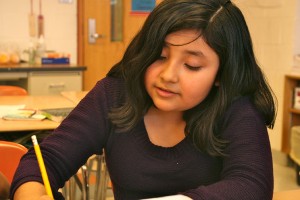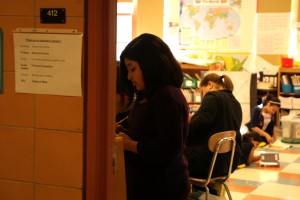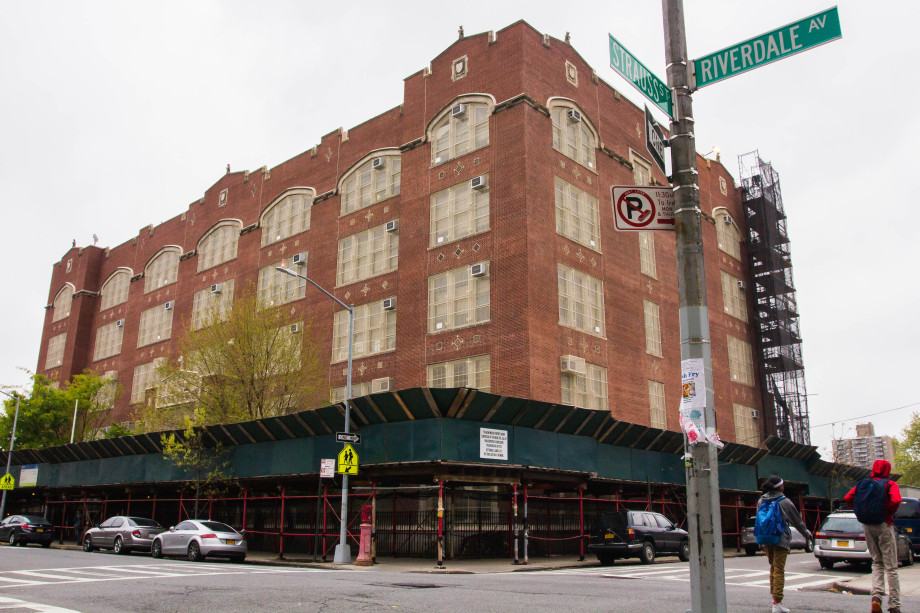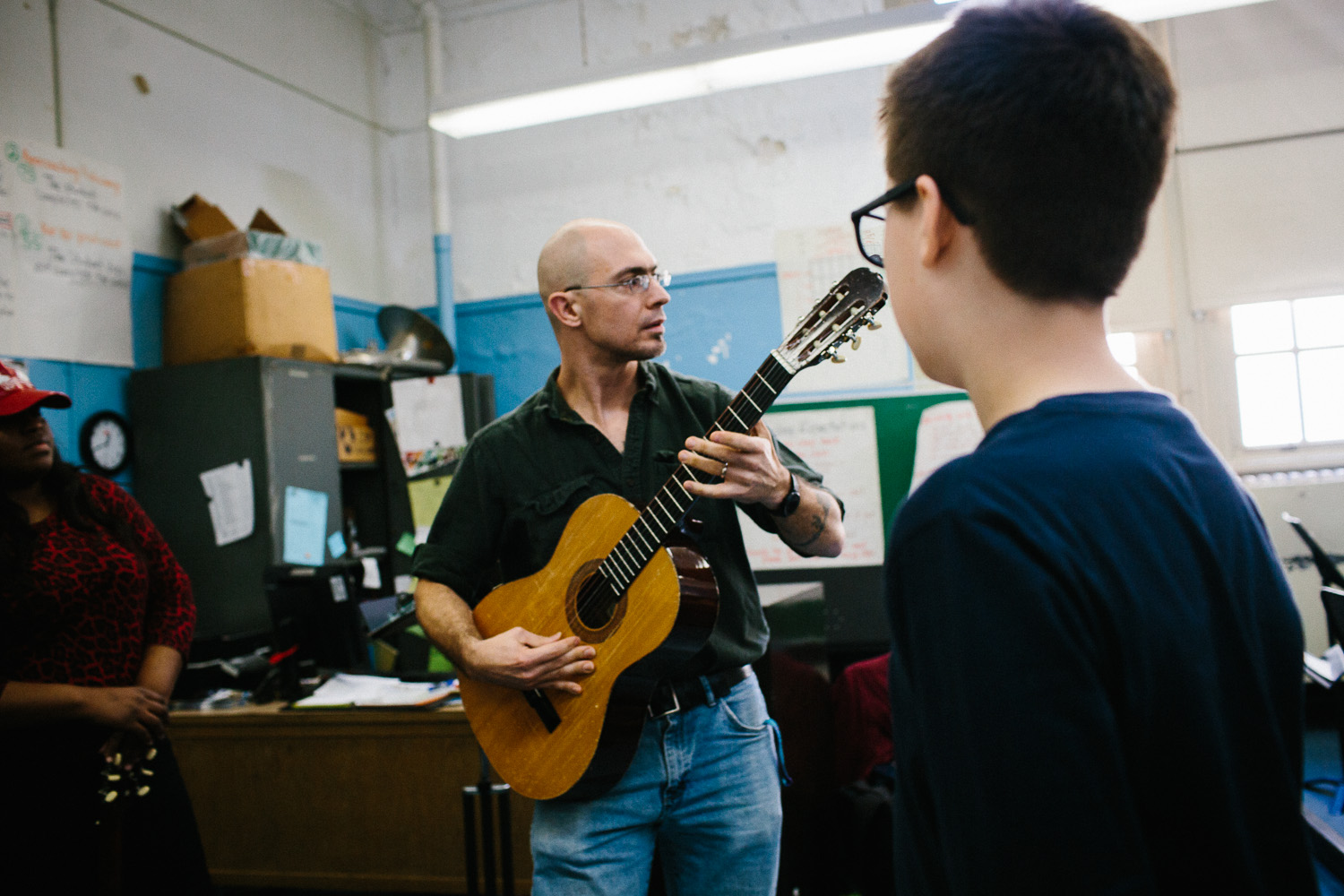
In a colorful fifth-grade classroom on the fourth floor of Public School 24 in Sunset Park, Brooklyn, restless children gathered in a cluster around their teacher for an early morning math lesson. They sat on the tile floor, some squirming and whispering to friends, others silently watching the problem that was being written on the board. Workbooks lay open on their laps, pencils in most of their hands.
“What is a factor pair for 94?” asked Aracely Comacho, their teacher.
The first hand up belonged to 11-year-old Ariana Oyola, her purple sweater a blur as she waved her arm impatiently. “I’m seeing the same hands,” Ms. Comacho warned. Ariana’s arm was getting tired, and as her body tipped over slightly, her arm came dangerously close to hitting the unassuming boy next to her. “Why won’t she just call on me?” Ariana wondered. She knew she had the right answer. Factor pairs were easy for her.
The boy who had been called on gave the wrong answer. Ariana tried to whisper the right answer.
“Don’t tell him. No, Ariana,” Comacho warned. The boy’s second guess was correct. Ariana nodded in approval and looked down at the next problem.
It was one of many times during the day when Ariana had to stop herself from answering for others. She was used to interpreting — English for her mother, rules for unruly classmates, and problem number five on the math quiz for confused math partners.
When put in this role, she tried to be as nice as possible. Four years of being bullied had taught her to live by the golden rule.
The bullying started almost as inexplicably as it ended. In first grade, a group of kids began calling her a “nerd,” and made fun of her for being overweight. It evolved into a cycle of “he said, she said.” If Ariana told her teachers about the bullies, the bullies would tell the teacher that Ariana had started it. Ariana says her teachers wrote on her report card that she needed to stop thinking she was always the victim.
But Ariana maintains that she always was the victim, and she still thinks about the jeers other kids made about her body. “They would say I was fat,” she said quietly, looking down at her desk. “And I really am. I’m trying to work on it.” It stopped suddenly at the end of fourth grade, and fifth grade has been, quite simply, “happy.”

At home, life is more complicated.
Ariana’s mother, Marisol, moved to the United States from Peru, settled in Virginia, married, and gave birth to Ariana. When her daughter was only a toddler, Marisol left her first husband and moved up to New York City. Her mother’s new husband is the one Ariana considers her father.
The family lives in an apartment above a laundromat in the heart of Sunset Park. They moved recently, after bugs invaded their old apartment. Ariana says she feels safer in her new home, which is on a quiet street near a grocery store and a library. She didn’t like the looks she used to get from men loitering on the streets as she walked to church in her old neighborhood. And there’s more room in her new home for her newborn brother and two-year-old sister.
Inside the apartment, large windows allow light to bounce off clean white walls. Empty Ikea furniture boxes have been pushed into one of the bedrooms, and unpacked belongings peek out of small boxes stacked beneath the kitchen table.
At home, Ariana is a cook, a cleaner, and a caretaker. But perhaps her biggest responsibility is helping her mother communicate. She can speak broken English, but prefers Spanish, and Ariana is skilled at both.
On Jan. 7, at a doctor’s office in Fort Hamilton, Brooklyn, Ariana and her then pregnant mother sat in a small crowded waiting room, waiting to find out if the pain in Marisol’s stomach was from labor. Everyone was speaking English, and Marisol had brought Ariana along to make sure the obstetrician understood her condition. When they were called back to see the doctor, Ariana calmly explained the contractions and symptoms her mother was having. “You need to go to the emergency room,” the doctor responded. Ariana translated the order to her mother.
The nearest hospital, however, was over 20 blocks away. The family had used their available money to pay for a cab to the obstetrician so they walked the entire way. Ariana’s brother was born three days later.
Ariana worries that her mother, who has been seeing an immigration lawyer, may have to return to Peru until she receives her papers. She worries that she will miss school, and is willing to go live with her step-grandmother in the basement of their old apartment to ensure she can stay at P.S. 24. She has accompanied her mother to meetings on the Sunset Park street where “all the lawyers are,” but doesn’t understand the laws she translates for her mom.

The role of an interpreter is common for children of immigrants, says Christina Fuentes, the principal of P.S. 24, which is a dual language school that develops academic skills in both English and Spanish. In the area around the school, nearly 40 percent of residents were born outside the country, according to the 2010 Census. The school is 90 percent Hispanic, and half the kids are classified as English Language Learners. Fuentes sees children frequently helping their parents navigate the English-speaking world. “They take on responsibilities and have a consciousness that other kids don’t,” Fuentes said. It is natural regardless of the country or language, and most students don’t think twice about the extent to which their parents rely on them, she added.
The stress of Ariana’s family situation — moving, and introducing a newborn to the household — has been hard on Ariana. Her mother doesn’t sleep much, and Ariana rarely eats breakfast before heading off to walk the 10 blocks to school, bundled in a puffy purple jacket, and rolling her purple wheeled backpack behind her.
At home, Ariana is like a “second mother” to the kids, her mother says. But at school, she gets the chance to be just like any other fifth grader.
She watches the boys play soccer at recess. Her friends all like the same boy, the one they call “blueberry,” because of his blue hat. Sitting on the floor of the fourth floor hallway one afternoon, Ariana looked at her close friend Nataly. “She always flirts with him,” she accused. “No, I just play with him,” Nataly responded. Ariana laughed. If she was still annoyed, she didn’t show it.
On afternoons when an old woman sells chocolate bars outside the gates of the school, Ariana is quick to hand over the money that she usually reserves for McDonalds, or a snack from a local bodega. She texts with her friends, she loves the color gold, and she sings along to Britney Spears and Nicki Minaj. Comacho, her teacher, says that Ariana has less responsibility at school and is able to focus more on herself. Comacho says that in class, Ariana just wants to do her work and show that she knows what’s going on in the lesson.
Like any little girl, Ariana has big dreams. She wants to move to Miami, a place her parents have spoken about. She wants to see Disneyland and slide down waterslides. She wants to be accepted to a good middle school and become a surgeon. She wants, at most, two kids. Her job will keep her busy, and she says she doesn’t want to be responsible for lots of kids. Her mother supports these dreams. She likes the idea of Ariana becoming a surgeon, but overall, she says she just wants her daughter to be happy.
And Ariana wants the same for her mother, who she says is strong, but changed by their recently chaotic lives. Everything, Ariana says, will get better in a few months.




Its nice to see an article that does not berate public schools but is still honest. I like the reminder of what it is to be a child that this article brings forth. We are studying bullying right now and trying to understand that we all come to school with different weights and experiences on our shoulders. I think this article will be a perfect pairing to our lesson next week.